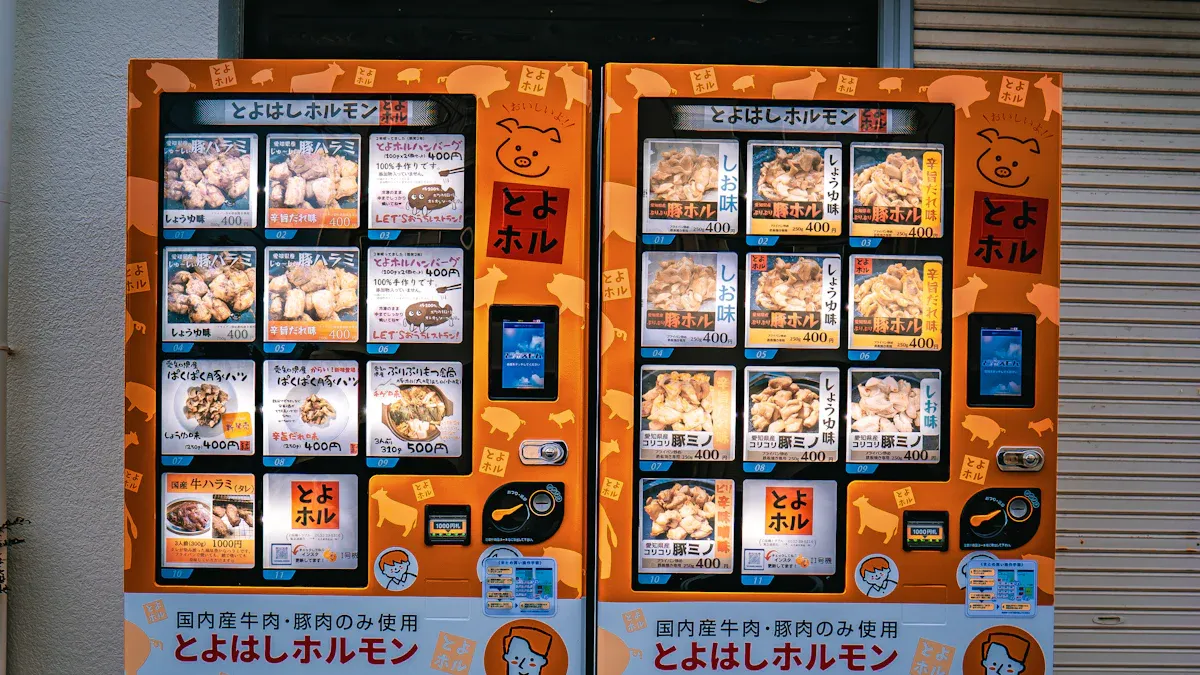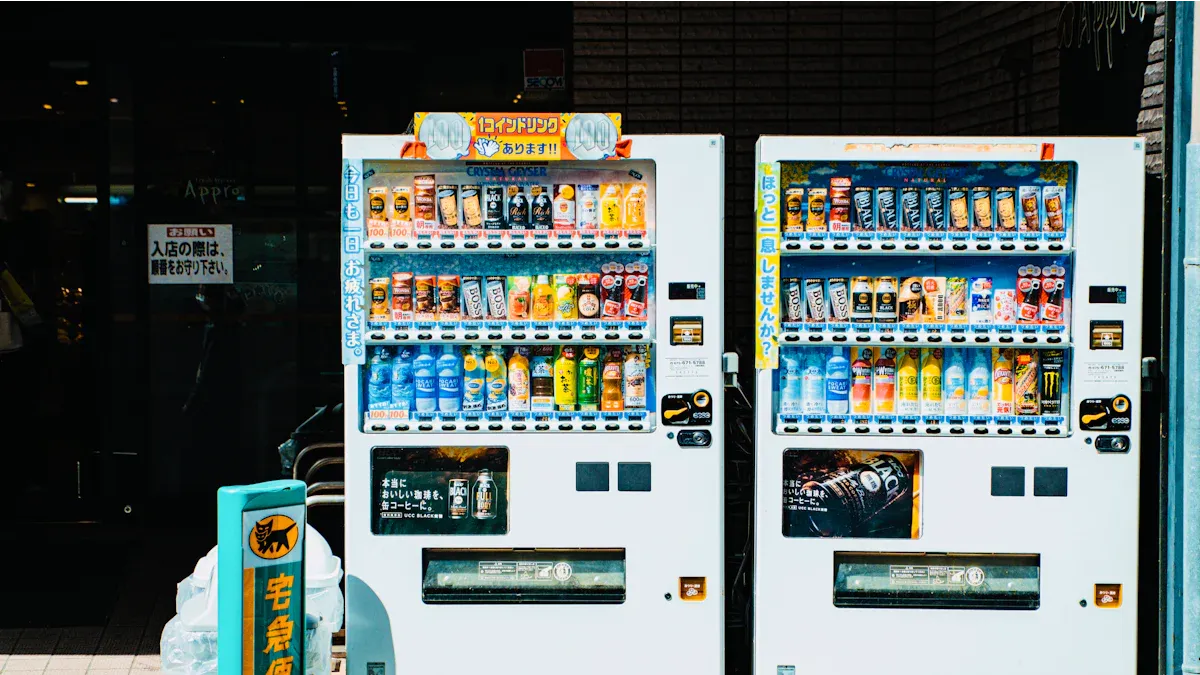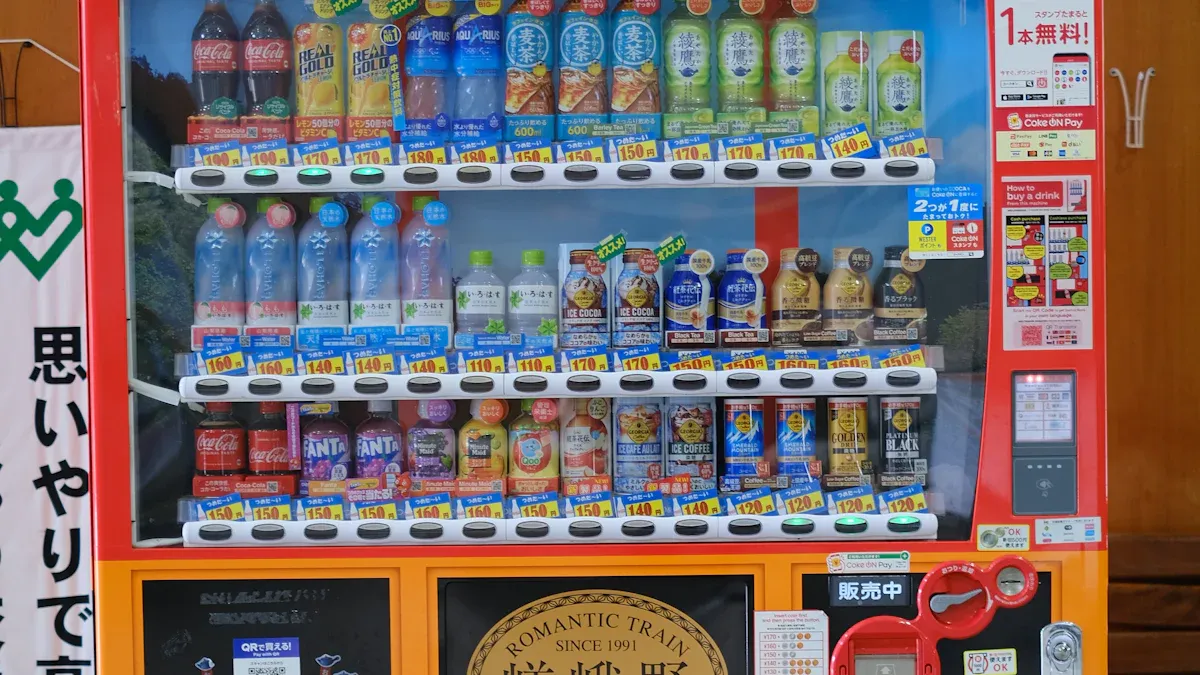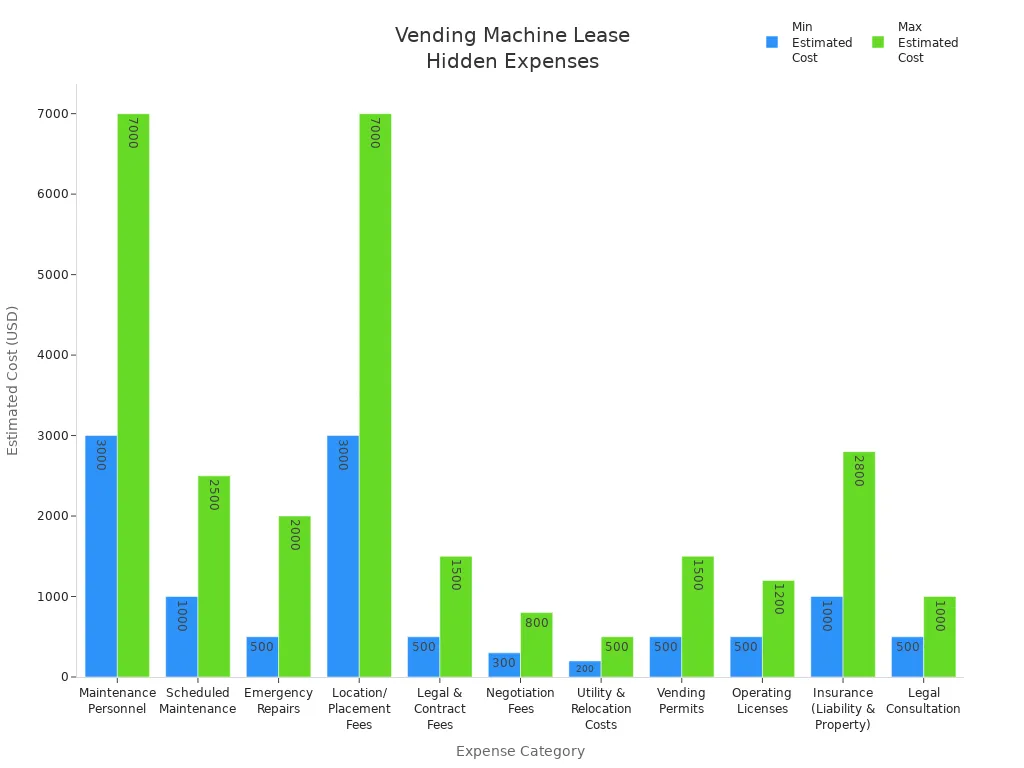Flexible Vending Machine Lease Options for Your Business Needs

You can meet your business needs with a vending machine lease that offers true flexibility. Many businesses choose flexible vending machine rental options to save on upfront costs and keep cash flow steady. You get access to the latest vending technology and can adjust your lease to match your business needs as they change. Whether your business grows or shifts direction, flexibility ensures you always have the right solution. Enjoy convenience and peace of mind while you focus on your core business needs.
Key Takeaways
Flexible vending machine leases help businesses save money by lowering upfront costs and offering easy upgrades.
Short-term, long-term, month-to-month, and lease-to-own options fit different business needs and budgets.
Most rental agreements include maintenance and support, so you can focus on your business without worrying about repairs.
Choosing the right lease means assessing your business needs, comparing costs, and picking a provider who offers flexibility.
Customizable product choices and upgrade options let you keep your vending machines fresh and appealing to customers.
Vending Machine Lease Options

Short-Term Rental
Short-term vending machine rental solutions give you the most flexibility for short-term business needs. You can rent a machine for a few days, weeks, or months. This option works best when you need temporary vending solutions for special events or trial periods.
Tip: Short-term rentals help you test new locations or vending ideas without a big investment.
Many businesses use short-term rentals, including:
Event organizers who want to offer snacks and drinks at concerts or festivals.
Sports tournaments that need vending machines for players and fans.
Temporary job sites where workers need quick access to refreshments.
Businesses or individuals who want to try vending before making a long-term commitment.
Short-term vending machine rental solutions help you reduce startup costs and scale up or down as your needs change. You can choose from modern rental machines or used ones, depending on your budget and goals.
Long-Term Lease
A long-term vending machine lease is a great choice if your business has stable, ongoing vending needs. You sign a contract that usually lasts 12 months or more. This option gives you lower monthly payments and helps you plan your budget.
Lease Duration | Description | |
|---|---|---|
Short-term (1-6 mo) | Higher monthly cost, flexible, for events | Higher than long-term leases |
Long-term (12+ mo) | Lower monthly rates, less flexibility | |
$150 - $500+ (advanced/specialty) |
Long-term leases support your business by:
Lowering your initial costs, so you do not need to spend a lot of money upfront.
Including maintenance, which means you do not have to worry about repairs.
Giving you the option to upgrade your equipment as your business grows or technology changes.
You can choose basic snack machines or advanced models with cashless payment and touchscreens. Some providers offer revenue share models, where you pay a percentage of sales instead of a fixed fee. This works well in busy locations.
Month-to-Month Rental
Month-to-month vending machine rental solutions give you the most flexibility. You can rent a machine for as long as you need and stop anytime. This is perfect for businesses with changing needs or those testing new products and locations.
You do not have to sign a long contract. You can adjust your vending machine lease as your business changes. This option helps you manage cash flow and avoid long-term commitments. Both new and used machines are available for month-to-month rental, so you can pick what fits your budget.
Lease-to-Own
Lease-to-own programs let you rent a vending machine with the option to buy it later. You make regular payments, and after a set period, you own the machine. This is a smart choice if you want to build equity in your equipment while keeping upfront costs low.
Lease-to-own works well for businesses that want to start small and grow over time. You can use modern rental machines or choose used ones if you want to save money. Maintenance is often included during the lease period, which helps you focus on your business needs.
Note: Lease-to-own gives you the flexibility to upgrade or switch machines before you commit to ownership.
How Lease Options Support Different Business Models
Vending machine lease and rental solutions fit many business types, such as office buildings, schools, and retail locations. You can start with one machine and add more as your business grows. Leasing helps you meet local rules and standards, like ADA compliance and food safety. Maintenance and upgrades are often included, so your machines stay up to date.
Leasing or renting machines keeps your startup costs low and lets you adapt to customer needs. You can offer healthy snacks in schools or specialty items in offices. Rental agreements also make it easier to work with property owners and move machines if your business changes.
New vs. Used Machines
You can lease or rent both new and used vending machines. New machines have the latest features and are more reliable, but they cost more. Used machines are cheaper but may need more maintenance. Leasing usually includes maintenance, which helps you avoid extra costs. You can choose the option that fits your short-term business needs and budget.
Flexible Vending Machine Rental Features

Custom Terms
You can shape your flexible vending machine rental agreement to fit your business. Providers let you choose the contract length, payment schedule, and even how you share profits. Most agreements include clear details about who handles maintenance, insurance, and what happens if you want to end the contract early. You might see these common custom terms:
Contract length and how to end the agreement
Payment frequency, such as monthly or quarterly
Maintenance and service responsibilities
Insurance and liability rules
Machine specifications and location plans
Product lists and service schedules
Flexible rental plans help you match your vending solution to your business timeline. You can also add special clauses for things like exclusivity or utility costs. This flexibility means you can adjust your agreement as your business grows or changes.
Upgrade Options
You can keep your business up to date with the latest vending technology. Many flexible vending machine rental providers offer upgrade options. You might want to swap your current machine for a newer model or switch to a micro market setup. Upgrading lets you offer cashless payments, touchless features, or more food choices.
Upgrading or swapping machines can boost convenience for your customers and improve business operations. Micro markets, for example, allow real-time inventory tracking and offer fresh, healthy food options. This can increase employee satisfaction and support your business goals.
Flexible rental plans make it easy to stay current without large upfront costs. You can respond quickly to new trends or customer needs.
Maintenance Included
Most flexible vending machine rental agreements include maintenance and support. Providers usually handle repairs, restocking, and cleaning. This service reduces downtime and keeps your machines running smoothly. You do not need to worry about unexpected repair bills or service calls.
Maintenance services often cover:
Regular restocking
Repairs and technical support
Cleaning and upkeep
Software updates
Bundled maintenance lowers your startup costs and simplifies management. You can focus on your business while the provider takes care of the machines. This convenience and reliability help you deliver a better experience for your customers.
Choosing a Vending Machine Lease
Assess Needs
You should start by looking closely at your business and its needs. Every business has unique goals, so you want a vending machine lease that matches your situation. Use a checklist to help you cover all the important points:
Review the contract term. Decide if you want a short lease for temporary workspaces or a longer one for steady locations.
Confirm where you can place the vending machines. Location matters for both sales and security.
Choose the right type of vending machine for your business. Some machines work better in temporary workspaces, while others fit busy offices.
Understand commission rates paid to property owners. These usually range from 10% to 25%.
Define who handles maintenance and restocking. This keeps your machines running and meets your business needs.
Check installation and stocking fees. These can affect your startup costs.
Set up security steps to prevent theft or vandalism.
Look for options to upgrade or change machines as your business grows.
Review how disputes get solved in the contract.
Make sure the agreement supports a strong relationship with the property owner.
You can also use tools like site analysis, product selection checklists, and maintenance plans. These help you meet your business needs and keep vending machines working well in temporary workspaces or permanent spots.
Compare Costs
Comparing costs helps you make smart choices for your business. Leasing often means lower upfront costs, which is great for temporary workspaces or when you want to save cash. However, you should look at the total cost over time. Here is a quick comparison:
Option | Upfront Cost | Monthly Payment | Maintenance Included | Flexibility | Total Cost (3-5 yrs) |
|---|---|---|---|---|---|
Lease | Low | Yes | High | Can exceed purchase | |
Purchase | $30,000-$150,000+ | None | No | Low | Usually lower |

Watch for hidden fees like maintenance, restocking, utilities, location fees, insurance, and permits. These can add up and affect your business budget. Always ask for a full list of costs before you sign a lease for your business needs.
Provider Flexibility
The best vending machine lease providers offer flexibility to match your business needs. You want a provider who lets you choose contract length, upgrade machines, and adjust services as your business changes. Look for these features:
Cashless and contactless payment systems for modern business needs.
Real-time sales and inventory tracking to help you stock the right products.
Fast maintenance and support to keep machines running in temporary workspaces or busy offices.
Easy ways to give feedback and get help.
A wide range of product choices, including healthy snacks for different business needs.
Providers who focus on flexibility help your business grow and adapt. They make it easy to serve both permanent locations and temporary workspaces, so you always meet your customers’ needs.
Vending Machine Rental Solutions FAQ
When you explore vending machine rental solutions, you may have many questions. Here are answers to the most common ones, so you can make informed decisions for your business.
Frequently Asked Question | Quick Answer |
|---|---|
Is there a cost to rent a vending machine? | Many providers offer machines at no upfront cost. Some use commission-based or self-managed models. Always ask about financial commitments. |
How does payment work? | Payment depends on the model. Some providers keep all revenue, while others share 5-20% with you. If you manage the machine, you keep all profits. Contactless payments can boost sales. |
How often is the machine restocked? | Restocking depends on traffic. High-traffic spots get weekly service. Moderate locations see biweekly visits. Low-traffic areas may get monthly restocks. Smart tracking helps optimize this. |
Who handles maintenance and repairs? | The provider usually takes care of maintenance and repairs at no extra cost. Most respond within 24-48 hours for breakdowns. |
What products can you stock? | You can choose from snacks, drinks, healthy options, or specialty items. Providers often let you customize the selection to fit your customers. |
Tip: If your business is seasonal, you can pause or adjust your vending machine rental solutions during slow periods. Providers can help you change stocking levels or switch to wholesale supply when needed.
Many people think vending machines run themselves. In reality, you need to plan for regular restocking, cleaning, and inventory checks. You may also face costs for fuel, product spoilage, and repairs. Technical issues like jams or cooling failures can cause downtime and lost sales. Most providers handle these problems, but you should know what to expect.
Profitability depends on your location, product choices, and how well you manage the machines. Average earnings reach about $75 per week in moderate traffic areas. You can increase profits by adding more machines, but this also means more work.
If you want to offer sensitive or specialty products, you must follow rules and label items clearly. Work with trusted providers to ensure safety and compliance. Always listen to customer feedback and adjust your offerings to meet their needs.
Flexible vending machine leasing gives you lower upfront costs, budget control, and easy upgrades. You can see the main cost-saving benefits in the table below:
Cost Saving Aspect | Explanation |
|---|---|
Lower Upfront Costs | You avoid large purchases and keep more cash for your business. |
Providers handle repairs, saving you time and money. | |
Reduced Downtime | Fast service keeps your machines running and profits steady. |
To choose the best option, follow these steps:
Compare rental agreements for flexible terms.
Check all costs, including utilities and maintenance.
Analyze locations for good foot traffic.
Use technology to track sales and inventory.
You get flexibility, support, and cost savings with these programs. Reach out to a provider to find the right fit for your business.
FAQ
How quickly can you get a vending machine installed?
You can usually get a vending machine installed within one to two weeks. Some providers offer faster service for urgent needs. Ask your provider about their delivery schedule.
Can you customize the products in your vending machine?
Yes, you can choose the products that fit your customers. Most providers let you select snacks, drinks, or healthy options. You can change your selection as your needs change.
What happens if your vending machine breaks down?
Most providers offer fast repair service. You can call or email them for help. Many fix problems within 24 to 48 hours. This keeps your machine running and your customers happy.
Do you need a special permit to place a vending machine?
Location Type | Permit Needed? |
|---|---|
School | Yes |
Office Building | Sometimes |
Public Space | Yes |
Check local rules before you install a machine. Your provider can help you with permits.
See Also
Exploring Key Features And Advantages Of Vending Machines
Understanding The Expenses Involved With Custom Vending Machines
Find Top Micro Market And Vending Options For Your Company
A Comprehensive Guide To Vending Machine Pricing Today
Detailed Cost Analysis Of Vending Machines And Pricing Factors
